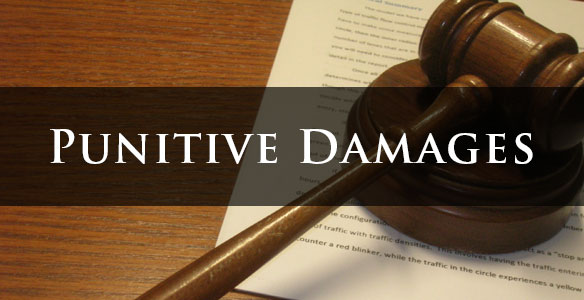Understanding Punitive Damages

There are two different types of damage awards the court can award the injured party: compensatory and punitive.
While compensatory damages cover actual costs such as lost wages, repairs to a vehicle, and other things that have an actual monetary value attached to them, punitive damages are intended to monetarily punish those whose conduct was egregiously insidious, and are only awarded in special cases. The analogy behind a damage award for punitive damages is the defendant should be punished in addition to paying to the award for expense reimbursement (compensatory damages).
While punitive damage awards are intended to punish the defendant (and ultimately benefit society), these damages are actually paid to the plaintiff or the party who filed the lawsuit. Many people see these awards as financial windfalls for the plaintiffs because they provide the plaintiff with a means to benefit financially after the accident. It’s important to understand though, that punitive damages are almost NEVER awarded.
Laws related to punitive damages vary from state to state, and are quite controversial. Some states actually allow juries to award punitive damages in any amount they believe is appropriate in a particular case. Depending on the case, a plaintiff could receive a multi-million dollar award for punitive damages. In other states, the amount of punitive damage awards are limited to particular types of cases, or they may place statutory limits on the amount of money a judge or jury can award in punitive damages.
Notable Punitive Damage Awards
We’ve all heard of the infamous McDonald’s hot coffee lawsuit. Unfortunately, those without intimate knowledge of the case actually use this as an example of the ridiculousness of punitive damages. In the 1992 case of Liebeck vs. McDonald’s, a 79-year-old woman suffered severe burns and was hospitalized for eight days after spilling a cup of hot coffee. McDonald’s refused to pay for the woman’s related expenses of $18,000, and the case went to trial.
In court, it was revealed that McDonald’s kept their coffee at a temperature far too high for human consumption. They did this in order to reduce the amount of refills they had to serve (patrons couldn’t drink it as fast), and to enhance the aroma in the restaurant in an effort to sell more coffee. It was also discovered in court that McDonald’s had received more than 700 reports of burns due to overheated coffee, yet continued to put profits ahead of common sense safety. It’s for that reason that the jury awarded punitive damages equivalent to one or two days’ worth of McDonald’s coffee revenues ($2.86 million). Again, this money was not awarded to compensate Mrs. Liebeck, but rather to PUNISH McDonald’s for their egregious behavior.
What many people don’t know is that McDonald’s never actually had to pay anywhere close to that amount. The judge reduced the total award to $640,000, and both parties eventually entered into a confidential settlement before an appeal was decided.
Another notable case involving punitive damages was the famous lawsuit against tobacco maker R.J. Reynolds. The jury awarded a widow $23.6 billion in punitive damages after her husband died of lung cancer in 1996 at the age of 36. The basis of the lawsuit was that the tobacco giant knew of the dangers of smoking and failed to notify the public of those dangers. While this case certainly drew headlines, it’s important to understand that the amount awarded will almost certainly be significantly reduced. Again, the award was not given because the plaintiff suffered $23B in damages; it was issued in order to punish the tobacco company for their insidious behavior. It’s simply unfair to blame the victim for being awarded punitive damages.
Punitive Damage Awards in Texas
Many people are unaware that the State of Texas places limits (caps) on damages as well. This limitation is contained in Chapter 41 of the Texas Civil Practices and Remedies Code and includes all actions in which an injured party seeks monetary recovery of damages. Chapter 41 also states the highest monetary damages the court or jury may award in specific types of lawsuits as well as defining those actions that are subject to monetary compensation under Texas law.
The provisions of Chapter 41 do not allow for any punitive damage award unless the plaintiff proves the harm for which he is seeking relief is the result of one of the following:
- Fraud
- Malice
- Gross negligence
Unlike many other states, Texas has very few awards for punitive damages because of the restrictions on filing these types of claims.
Final Word
Because cases where punitive damages are awarded make the headlines, many people mistakenly believe that a lawsuit is like a lottery ticket where you can actually financially benefit from an injury. The truth is that punitive damages are only awarded in about 5 percent of all civil lawsuits, and the median punitive damage award is between $38,000 and $50,000. Civil lawsuits are intended to allow the plaintiff (victim) to return to the same position he or she was prior to a personal injury. When it comes to punitive damages, don’t believe the hype.
Category: Legal Briefs






